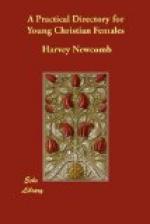And he has farther sanctioned the practice, by giving
directions respecting its performance. We have
also examples in the Acts of the Apostles. The
prophets and teachers, in the church at Antioch, fasted
before separating Barnabas and Paul as missionaries
to the heathen. And when they obtained elders
in the churches, they prayed,
with fasting.
Paul, in his epistle to the Corinthians, speaks of
their giving themselves to
fasting and prayer,
as though it were a frequent custom. You will
find, also, in examining the lives of persons of eminent
spiritual attainments, that most of them were in the
habit of observing frequent seasons of fasting and
prayer. There is a peculiar fitness in this act
of humiliation. It is calculated to bring the
body under, and to assist us in denying self.
The length of time it gives us in our closets also
enables us to get clearer views of divine things.
But there is great danger of trusting in the outward
act of humiliation, and expecting that God will answer
our prayers for the sake of our fasting. This
will inevitably bring upon us disappointment and leanness
of soul. This is the kind of fasting so common
among Roman Catholics, and other nominal Christians.
But it is no better than idolatry. Most of the
holidays which are usually devoted by the world to
feasting-and mirth are very suitable occasions for
Christians to fast and pray; and this for several
reasons: (1.) They are seasons of leisure, when
most people are disengaged from worldly pursuits. (2.)
The goodness of God should lead us to repentance.
Instead of spending these days in mirth over the blessings
we have enjoyed, we should be looking into our hearts,
to examine the manner in which we have received them;
humbling ourselves on account of our ingratitude; and
lifting up our hearts and voices in thanksgiving for
them. (3.) The first day of the new year, birth-days,
&c., are very suitable occasions for renewing our
past lives, repenting of our unfaithfulness, making
resolutions of amendment, and renewing afresh the
solemn dedication of ourselves to God.
When you set apart a day of fasting and prayer, you
ought to have in view some definite and particular
objects. The day should be spent in self-examination,
meditation, reading the Scriptures, confession of sin,
prayer for the particular objects which bear upon your
mind, and thanksgiving for mercies received.
Your self-examination should be as practical as possible;
particularly looking into the motives of your prayers
for the special objects which bear heavily upon your
heart. Your confession of sin should be minute
and particular; mentioning every sin you can recollect,
whether of thought, word, or deed, with every circumstance
of aggravation. This will have a tendency to affect
your heart with a sense of guilt, produce earnest
longings after holiness, and make sin appear more
hateful and odious. Your meditations should be
upon those subjects which are calculated to give you




